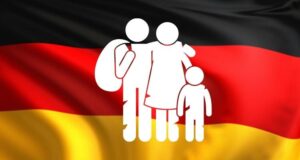
More than 244,000 people applied for asylum in Germany last year, with citizens of Syria topping the list, the Associated Press reported Wednesday.
The agency notes that according to German statistics, citizens of Afghanistan, Turkey and Iraq followed the Syrians in the list.
In addition, more than a million citizens of Ukraine arrived in the country, but they do not have to apply for asylum, because they immediately receive a temporary residence permit.
Berlin notes that in 2022 the number of refugees increased by 27.9% compared to 2021, especially in the last three months of 2022.
German Interior Minister Nancy Feser said the government is trying to integrate refugees as quickly as possible in the life of the new place, for this purpose, German language lessons are held, and many other measures are taken. At the same time, she noted that German authorities are trying to do everything possible to deport from the country as soon as possible those who have been denied asylum.

German engineering company Krauss-Maffei Wegmann has begun production of RCH 155 self-propelled artillery units for Ukraine, Krauss-Maffei Wegmann advisor Nicholas Drummond said in a tweet.
“Sometimes combining two proven solutions into a new concept can be revolutionary, avoiding significant risk. Production of the Boxer RCH-155 for Ukraine has begun,” Drummond wrote.
In December, the German government officially confirmed that it was preparing 18 units of the latest RCH 155 wheeled units for Ukraine.
Ukrainian Defense Minister Oleksiy Reznikov made the request to Germany in July 2022.
The unit is operated by a two-man crew. The ammunition is 30 rounds. The manufacturer claims a range of 40 km and 52 km with V-LAP rounds.

European stock indices rose on Wednesday thanks to positive statistical data and forecasts from Germany as well as corporate news.
The Stoxx Europe 600 composite index of the region’s largest companies rose 0.8 percent to 427.51 points as of 11:30 a.m. The indicator ends 2022 with a decline of about 13% – the maximum since 2018, due to the negative impact of the situation in Ukraine, as well as the energy crisis on corporate profits and the economy as a whole, Bloomberg notes.
“We are facing a slowdown in economic growth, if not a recession, and we don’t see that factor being built into corporate earnings forecasts yet,” UBS Private Wealth Management financial adviser Sarah Poncheck said on Bloomberg TV.
Germany’s DAX stock index gained 0.76% in trading, France’s CAC 40 gained 0.91%, Britain’s FTSE 100 gained 0.44%, Italy’s FTSE MIB gained 0.68% and Spain’s IBEX 35 gained 0.55%.
Data from research firm GfK, released Wednesday, showed improved consumer sentiment in Germany. The leading indicator assessing consumer confidence prospects for January 2023 rose to minus 37.8 points from minus 40.1 points in December. The index has been rising for three months in a row thanks to measures taken by the German authorities to reduce energy costs for residents, GfK noted.
“It is clear that the steps taken by the German authorities to limit energy prices are having an effect. However, it is too early to say that all the problems are over. The improvement in consumer sentiment that we are seeing at the moment remains fragile,” said GfK consumer sector expert Rolf Bürkl.
“The German Employment Barometer, calculated by the Ifo economic institute, shows a positive outlook for the German labor market in the first quarter of next year. This is mainly due to improvements in the service sector, whose workers are optimistic about the near future, the Ifo said Wednesday.
Stock prices of European sports goods manufacturers rose on Wednesday thanks to stronger-than-expected reports from U.S. competitor Nike Inc. Shares of Adidas AG jumped 7.7%, Puma SE rose 8.5% and British sporting goods retailer JD Sports gained 6.7%.
Uniper SE shares rose 5.9% after the European Commission approved a stabilization package providing, in particular, to increase the capital of the energy company by 8 billion euros.
Among the leaders of growth in Germany were the shares of online retailer Zalando (+4.5%), real estate company Vonovia (+2.6%) and Deutsche Post (+1.3%).
In Britain, Prudential Plc (+1.5%), Shell (+0.9%), Diageo (+0.8%) gained strongly, in France – TotalEnergies SE (+1.6%), L’Oreal (+1.4%), Schneider Electric (+1.3%).

The German government through the Reconstruction Credit Institution (KfW) will lend EUR32.5 million to Ukrenergo to restore eight high-voltage substations in the south and west of Ukraine, the company said.
According to its Facebook post on Friday, Ukrainian Finance Minister Serhiy Marchenko and NEC Board Chairman Volodymyr Kudrytsky signed the relevant agreements with KfW. This is NEC’s third project with the German state bank KfW, through which its government is providing financial support to Ukrenergo.
“These funds will already be working in the interests of Ukrainian consumers in the near future: equipment will be installed at the substations that will make it possible to control their work remotely from the central dispatcher’s office. The restored substations will be automated, require minimal staff and meet ENTSO-E requirements for reliability of the power transmission system and grid safety,” explained Ukrenergo.
The company expressed its sincere gratitude to its European partners for their timely assistance, which is very much needed today.
For its part, the Ministry of Finance said on its website that its head during a meeting with Anka Feldhusen, Ambassador Extraordinary and Plenipotentiary of Germany to Ukraine, signed a guarantee agreement with KfW for the new project “Increasing the Efficiency of Power Transmission (Substation Modernization) II”, and Ukrenergo head signed a loan agreement with KfW for EUR32.5 million for this project.
During the meeting there were also signed agreements on debt deferral between the government of Ukraine and KfW, the Ministry of Finance pointed out.
According to its report, an agreement was reached to postpone repayment of Ukraine’s debt under the attracted loans from KfW under the four existing projects from 2022-2023 to 2027-2031.

Germany will provide Ukraine with €56 million in financial aid and 350 generators to restore its energy infrastructure, the German government’s press service said after a conversation between Ukrainian President Vladimir Zelensky and German Federal Chancellor Olaf Scholz.
“President Zelensky briefed on the consequences of Russian airstrikes on civilian infrastructure, water and electricity supplies. The Chancellor condemned the ongoing shelling and assured Ukraine of further short-term support. So far, the federal government has provided short-term financial assistance to repair energy infrastructure of about 56 million euros, and Germany is providing more than 350 generators,” the chancellor said in a statement posted on his website Tuesday evening.
In addition, Scholz “confirmed Germany’s continued support for Ukraine, including air defense and long-term reconstruction.”

Germany will support Ukraine’s agricultural sector by the end of this year providing EUR 9 million to buy generators and help restore war-affected farms, while the countries are coordinating a joint EUR 5 million project to develop Ukrainian horticulture.
According to the website of the Ministry of Agrarian Policy and Food on Friday, the German Minister of Agriculture Cem Ozdemir and the head of the Ukrainian Ministry of Agriculture Mykola Solskyi have agreed on the financial aid.
According to the department, Solskyy said that the project is very relevant to Ukraine on the background of the government program, which provides an opportunity to receive a grant for the development of their own horticulture, berry growing and viticulture, and which enjoys great popularity among farmers. Thus, during the five months since its launch grants for more than 240 million UAH have been agreed upon.
In addition, the ministers discussed enhancing cooperation on the Grain from Ukraine food initiative, within the framework of which the United States through its Agency for International Development (USAID) will provide up to $20 million. Solskyy also thanked Germany for being one of the first countries that joined this humanitarian program and funded the transportation of a shipload of grain from Ukraine to Ethiopia.
“Many countries have indicated that they are willing to participate in this program. This is important because of several aspects. First, it is right from the point of view of humanitarian relations in the world. Secondly, Africa needs to know who really cares about it, and because of the actions of which country they are suffering. We are working to make sure that the grain corridor continues to work as long as possible so that we can get our food to where it is needed all the time. And, of course, we will be grateful for the continued support of our partners,” the Ministry of Agrarian Policy quoted Solskyi as saying.